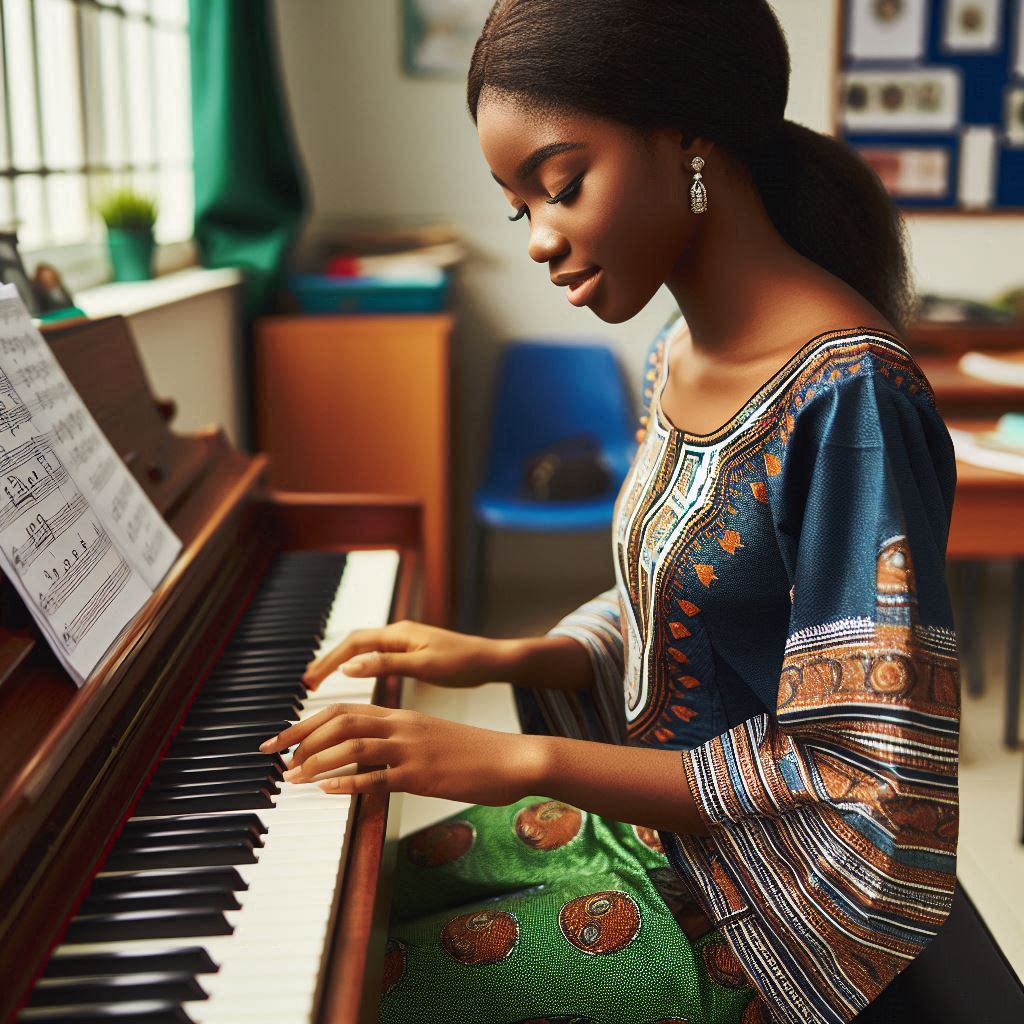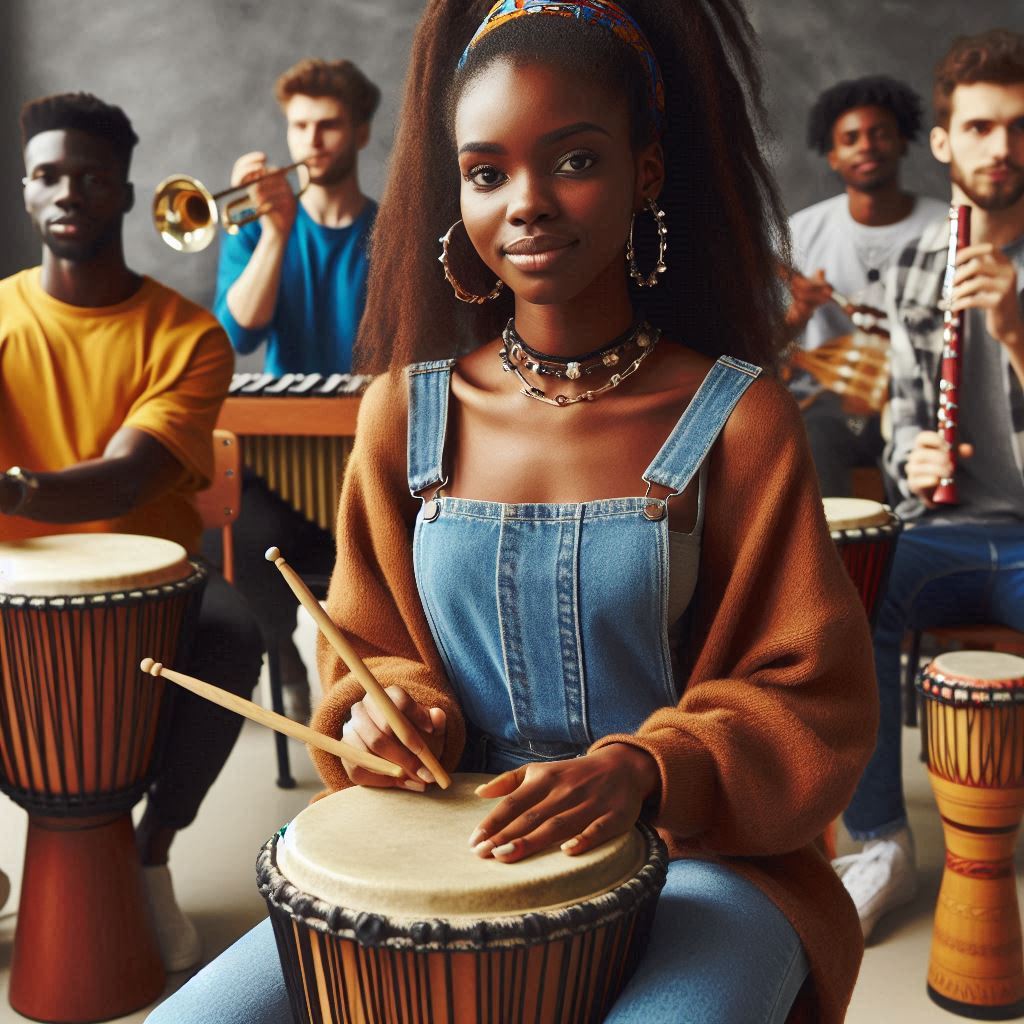Introduction
Music programs in Nigerian schools play a crucial role in enhancing students’ overall development. These programs help students to explore their creativity, improve their coordination, and boost their cognitive abilities.
Importance of Music Programs
Music programs provide a platform for students to express themselves creatively and emotionally. They also promote teamwork, discipline, and self-confidence among students.
Academic Benefits
Engaging in music programs can improve students’ academic performance by enhancing their memory, concentration, and critical thinking skills. It also helps in developing their language and mathematical abilities.
Personal Development
Music programs teach students important life skills such as perseverance, resilience, and time management. They also provide a positive outlet for students to channel their emotions and reduce stress.
Social Skills
Participating in music programs allows students to collaborate with their peers, develop empathy, and improve their communication skills. It creates a sense of belonging and fosters a supportive community within the school.
Cultural Awareness
Music programs expose students to a diverse range of musical styles, traditions, and cultures. This helps in promoting cultural appreciation, understanding, and tolerance among students.
Therefore, it is essential for Nigerian schools to prioritize and invest in music programs to ensure holistic development and well-being of their students.
Music education goes beyond just learning an instrument; it shapes students into well-rounded individuals ready to face the challenges of the future.
Curriculum
Description of the Music Curriculum in Nigerian Schools
The music curriculum in Nigerian schools is designed to provide students with a comprehensive understanding of music. It encompasses various elements, including music theory, practical skills, and performance opportunities.
Music theory forms the foundation of the curriculum, covering essential concepts such as notation, rhythm, harmony, and form. Students learn to read and interpret musical scores, understand the structure of compositions, and analyze different styles and genres of music.
Practical skills are also emphasized in the curriculum, allowing students to develop proficiency in playing musical instruments, singing, and composing music.
Hands-on activities and exercises help students hone their technical abilities, express their creativity, and explore different musical techniques.
Furthermore, the curriculum incorporates performance opportunities to enable students to apply their knowledge and skills in a real-world context. Students participate in concerts, recitals, and music festivals, where they showcase their talents and demonstrate their musical progress.
Importance of Including Music Theory, Practical Skills, and Performance Opportunities in the Curriculum
Including music theory in the curriculum is essential for providing students with a solid theoretical foundation in music.
Understanding music theory enables students to analyze and appreciate music more deeply, enhances their critical thinking skills, and prepares them for advanced study in music.
Practical skills are equally important, as they allow students to develop proficiency in playing instruments, singing, and composing music. These skills not only foster artistic expression but also promote teamwork, discipline, and perseverance among students.
Moreover, providing performance opportunities in the curriculum is crucial for allowing students to apply their knowledge and skills in a practical setting.
Performing in front of an audience helps students build confidence, overcome stage fright, and develop essential performance skills such as stage presence and communication.
By including music theory, practical skills, and performance opportunities in the curriculum, Nigerian schools ensure that students receive a well-rounded music education.
This comprehensive approach equips students with the knowledge, skills, and confidence they need to pursue their musical interests and aspirations, whether they choose to pursue a career in music or simply enjoy music as a lifelong passion.
Qualified Instructors
Need for Well-Trained Music Teachers in Schools
In the landscape of music education in Nigerian schools, the presence of well-trained music teachers holds paramount importance.
These educators serve as the cornerstone of music programs, shaping the musical journeys of students and laying the foundation for their future success.
The need for well-trained music teachers arises from the intricate nature of music instruction. Unlike many academic subjects, music requires a unique blend of technical knowledge, artistic expression, and pedagogical expertise.
Qualified instructors possess the specialized skills and understanding necessary to navigate the complexities of music education effectively.
Moreover, well-trained music teachers bring a wealth of experience and knowledge to the classroom.
They are adept at guiding students through the intricacies of music theory, helping them decipher complex musical notation, understand fundamental principles of harmony and rhythm, and analyze diverse musical compositions.
Furthermore, experienced music educators are skilled in fostering creativity and innovation among their students.
They create a supportive and nurturing learning environment where students feel encouraged to explore their musical interests, experiment with different techniques, and express themselves artistically.
Importance of Instructors with Experience in Music Education and Performance
Instructors with experience in both music education and performance offer a unique blend of expertise that enriches the learning experience for students. Their dual background equips them with a comprehensive understanding of music theory, pedagogy, and practical application.
Experienced music teachers understand the nuances of music instruction, tailoring their teaching methods to meet the diverse needs and learning styles of their students.
They employ a variety of instructional strategies, including hands-on activities, group collaborations, and individualized instruction, to ensure that every student receives personalized attention and support.
Moreover, instructors with performance experience bring a depth of insight into the practical aspects of music-making.
Drawing from their own experiences on stage, they can provide valuable guidance on technique, interpretation, and expression, helping students develop into confident and expressive performers.
Facilities and Equipment
Necessary Facilities and Equipment for a Successful Music Program
A successful music program in Nigerian schools requires access to essential facilities and equipment. These include dedicated music classrooms equipped with instruments, audio-visual resources, and practice rooms.
Instruments such as pianos, guitars, drums, and wind instruments are fundamental to music education. They allow students to explore different sounds, techniques, and musical genres, enhancing their musical proficiency and creativity.
Furthermore, audio-visual resources such as projectors, speakers, and recording equipment facilitate interactive learning experiences. They enable students to engage with multimedia content, analyze musical compositions, and enhance their understanding of music theory and history.
Practice rooms are also essential for providing students with a quiet and conducive environment to rehearse and refine their musical skills. These spaces offer students privacy and concentration, allowing them to focus on their practice without distractions.
Challenges Faced by Schools in Providing Adequate Resources for Music Education
Despite the importance of facilities and equipment, many schools in Nigeria face significant challenges in providing adequate resources for music education.
Limited funding and budget constraints often restrict schools’ ability to invest in musical instruments, audio-visual equipment, and practice rooms.
Additionally, the high cost of musical instruments and equipment poses a barrier to accessibility for many schools, particularly those in underserved communities. As a result, students may not have access to the necessary tools and resources to fully participate in music programs.
Furthermore, inadequate infrastructure and facilities present additional challenges for music education in Nigerian schools.
Some schools lack dedicated music classrooms or practice rooms, forcing students to practice in shared spaces or makeshift environments that are not conducive to learning.
Moreover, the lack of qualified technicians and maintenance personnel can lead to equipment breakdowns and delays in repairs, further exacerbating the challenges faced by schools in providing adequate resources for music education.
Read: Sociology Departments in Nigerian Universities
Performance Opportunities
Importance of Performance Opportunities for Students to Showcase Their Talents
In the realm of music education in Nigerian schools, the significance of performance opportunities cannot be overstated. These opportunities serve as platforms for students to showcase their musical talents, creativity, and dedication.
Participating in performances allows students to apply the knowledge and skills they acquire in music classes in a real-world context. It provides a tangible outlet for self-expression and artistic exploration, fostering a deeper connection with music and igniting a passion for performance.
The Benefits of Participating in Music Competitions and Concerts
One of the primary benefits of participating in music competitions and concerts is the invaluable performance experience it offers to students. Performing in front of an audience cultivates confidence, stage presence, and resilience, essential qualities for success in any musical endeavor.
Moreover, music competitions and concerts provide students with a platform to receive feedback and constructive criticism from judges, peers, and audience members.
This feedback helps students identify areas for improvement, refine their techniques, and strive for excellence in their performances.
Participation in music competitions also fosters healthy competition among students, motivating them to push beyond their limits and continuously improve their skills.
It instills a sense of discipline, determination, and commitment to excellence, qualities that are integral to success not only in music but in all aspects of life.
Furthermore, music competitions and concerts expose students to a diverse range of musical genres, styles, and traditions.
This exposure broadens their musical horizons, deepens their understanding of different cultural expressions, and fosters a spirit of appreciation for the rich tapestry of global music.
Read: Career Opportunities for Sociology Graduates in Nigeria
Collaboration with Music Professionals
Importance of Collaborating with Music Professionals for Workshops and Masterclasses
In the realm of music education in Nigerian schools, the significance of collaborating with music professionals cannot be overstated. These collaborations bring a wealth of benefits that enrich students’ learning experiences and enhance the overall quality of music programs.
Firstly, partnering with music professionals provides students with invaluable opportunities to learn from experts in the field.
Workshops and masterclasses conducted by seasoned musicians offer unique insights, techniques, and perspectives that go beyond what can be taught in traditional classroom settings. Students gain exposure to real-world practices, industry standards, and emerging trends in music.
Transform Your Career with Expert Guidance
Get personalized mentorship consulting that’s tailored to your unique path. Our expert advice is actionable and exclusive.
Get StartedMoreover, such collaborations expose students to a diverse range of musical genres, styles, and techniques. Professionals bring with them a wealth of experience spanning various musical traditions, from classical to contemporary, jazz to Afrobeat.
This exposure broadens students’ horizons, cultivates a deeper appreciation for different forms of music, and inspires them to explore new avenues of creativity.
How Such Collaborations Can Enhance Students’ Learning Experiences
Through hands-on experiences, students develop practical skills and techniques that are essential for their musical development.
Whether it’s learning a new instrument, refining vocal techniques, or mastering the intricacies of music production, workshops and masterclasses offer students the chance to put theory into practice in a supportive and immersive environment.
Moreover, collaborations with music professionals foster a culture of excellence and innovation within music programs.
By exposing students to high standards of performance, professionalism, and artistic expression, these collaborations inspire students to strive for excellence in their own musical pursuits.
They encourage students to push beyond their comfort zones, explore new creative territories, and challenge themselves to reach new heights of musical achievement.
Read: Challenges Facing Sociology Education in Nigeria

Student Involvement
Encouraging students to actively participate in music programs is crucial for their overall development. Here are some reasons why student involvement in music programs is essential
- It enhances creativity and self-expression
- It helps in building confidence and self-esteem
- It promotes teamwork and collaboration
- It improves cognitive skills and academic performance
- It provides a sense of belonging and community
One way to encourage student involvement is through extracurricular activities such as music clubs and ensembles. These activities offer students the opportunity to further explore their interest in music and develop their talents in a more relaxed and informal setting.
Music clubs allow students to socialize with like-minded peers, share their passion for music, and work on music-related projects together. This sense of camaraderie fosters a supportive and encouraging environment where students can feel free to express themselves creatively.
Ensembles, on the other hand, offer students the chance to collaborate with others in a musical ensemble, such as a choir, band, or orchestra.
This experience helps students improve their teamwork skills, learn how to work together towards a common goal, and hone their musical abilities through regular practice and performances.
Furthermore, participation in extracurricular music activities can also have a positive impact on students’ academic performance.
Studies have shown that students who are involved in music programs tend to have better grades, higher test scores, and improved problem-solving skills compared to their non-musical peers.
Overall, student involvement in music programs not only enriches their educational experience but also contributes to their personal growth and development.
Encouraging students to actively engage in music activities can have a lasting impact on their lives, shaping them into well-rounded individuals with a deep appreciation for the arts.
Read: The Role of Sociology in Nigerian Social Policy
You Might Also Like: Modern Trends in Nigerian Fine and Applied Art
See Related Content: Impact of European Languages on Nigerian Education
Find Out More: How to Write an Economics Research Paper in Nigeria
Find Out More: How to Apply for African and Asian Studies Programs
Assessments and Grading
Assessments and grading are essential components of music programs in Nigerian schools as they provide valuable insight into students’ progress and achievements.
Assessment Methods
- Performance Assessments
- Students are often required to showcase their musical abilities through performances.
- They may be evaluated on factors such as technical proficiency, musical interpretation, and overall presentation.
- Theory Assessments
- Tests and quizzes are used to assess students’ understanding of music theory concepts.
- Topics covered may include music history, notation, scales, and chord progressions.
- Listening Assessments
- Students are tested on their ability to recognize and analyze various musical styles, genres, and composers.
- They may be asked to identify key elements in musical compositions and explain their significance.
The Importance of Fair and Constructive Feedback
Providing students with fair and constructive feedback is crucial for their growth and development in music programs.
Benefits of Fair Feedback
Encourages Improvement
Constructive criticism helps students identify areas for improvement and strive for excellence in their musical pursuits.
Boosts Confidence
Positive feedback reinforces students’ confidence and motivates them to continue honing their musical skills.
Builds Resilience
Learning how to accept feedback positively teaches students resilience and the value of perseverance in the face of challenges.
Importance of Constructive Feedback
Identifies Strengths and Weaknesses
Constructive feedback helps students recognize their strengths and address areas needing improvement in their music performances.
Encourages Reflection
Feedback prompts students to reflect on their musical practices and consider alternative approaches to enhance their skills.
Fosters Growth Mindset
Constructive feedback fosters a growth mindset by emphasizing the importance of effort and continuous learning in music education.
Overall, assessments and grading play a vital role in shaping students’ musical journey, while fair and constructive feedback is key to their growth and success in music programs in Nigerian schools.
Learn More: Role of International Politics in Nigerian Economy
Support from School Administration
Importance of Support from School Administrators for the Success of Music Programs
Support from school administrators is paramount for the success of music programs in Nigerian schools. These leaders hold significant influence over educational policies and resource allocation, making their backing essential.
Administrators must recognize the multifaceted benefits of music education. It not only enhances students’ artistic abilities but also fosters cognitive development, emotional intelligence, and social skills.
By understanding these advantages, administrators can champion music programs within their schools.
Furthermore, administrators play a pivotal role in advocating for the integration of music into the curriculum. They can ensure that music receives equitable treatment alongside other academic subjects.
This recognition elevates the status of music education and reinforces its importance in students’ overall learning experience.
Need for Adequate Funding and Resources to Sustain Music Programs
Adequate funding and resources are the lifeblood of music programs. Without sufficient financial support, schools may struggle to provide quality music education.
Administrators must prioritize budgetary allocations for music programs, including instrument purchases, facility maintenance, and teacher salaries.
Additionally, administrators should actively seek external funding opportunities, such as grants and sponsorships, to supplement school budgets. This proactive approach ensures that music programs have access to additional resources beyond the school’s financial constraints.
Moreover, administrators must recognize the importance of investing in professional development for music teachers. Continuous training and support empower educators to deliver high-quality instruction and stay updated on best practices in music education.
Creating a conducive learning environment is another crucial aspect of supporting music programs.
Administrators should allocate dedicated spaces for music classes and rehearsals, equipped with instruments, audio-visual equipment, and soundproofing. These facilities facilitate immersive learning experiences and enhance students’ engagement with music.
Discover More: Mass Communication Project Ideas for Nigerian Students
Discover More: Prominent Nigerian Authors Writing in Foreign Languages
Conclusion
In closing, establishing robust music programs in Nigerian schools necessitates several key requirements.
Firstly, the presence of dedicated and qualified music teachers is paramount.
These educators play a vital role in imparting musical knowledge and nurturing students’ talents.
Secondly, adequate funding is essential to support the purchase of musical instruments, maintenance of facilities, and organization of extracurricular activities such as concerts and competitions.
Without sufficient financial resources, schools may struggle to provide quality music education to their students.
Furthermore, access to a diverse range of musical instruments and resources is crucial for a comprehensive music program.
Students should have the opportunity to explore various instruments and musical styles, allowing them to develop a broad understanding of music.
Lastly, it is imperative to recognize the importance of investing in music education for the overall development of students.
Music has been shown to enhance cognitive skills, creativity, and emotional well-being.
By providing students with access to music education, schools can foster a more enriching learning environment and contribute to the holistic development of young individuals.




